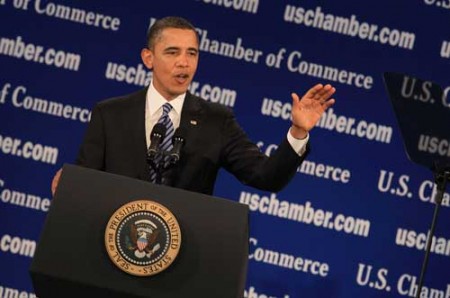 WASHINGTON, D.C.—Many in the labor movement objected to President Barack Obama speaking at the Chamber of Commerce yesterday. Yet there was little protest from AFL-CIO leaders to the president’s speech.
WASHINGTON, D.C.—Many in the labor movement objected to President Barack Obama speaking at the Chamber of Commerce yesterday. Yet there was little protest from AFL-CIO leaders to the president’s speech.
For the first time, President Obama ventured over to the Chamber of Commerce to speak. While the speech was full of the usual platitudes of most Obama speeches, what mattered most was not what he said, but the speech’s symbolism. By speaking at the Chamber, President Obama was offering an olive branch to the very organization that has led attacks against him.

The president defended some of his regulatory agenda and tax policies. He also called on CEOs to create more jobs in America. But he made no mention of the Chamber’s tolerance of unionbusting policies that lead to nearly 30,000 reported cases of unfair labor practices against U.S. workers by companies every year.
The symbolism of the speech upset many in the labor community. Ralph Nader wrote an open letter to the President suggesting “What about walking next door and visiting your political friends at the headquarters of the AFL-CIO, whose member unions represent millions of working Americans? You can discuss with Richard Trumka, a former coal miner and the new president of the AFL-CIO, your campaign promises in 2008. Repeatedly you said to the American people that you supported the “card check” and a “federal minimum wage of $9.50 in 2011.”
The AFL CIO neither organized a protest of the president’s speech nor extended an invitation for the president to cross the street and speak at the AFL CIO headquarters (where Obama has never given a speech).
Two unions—the National Nurses Union/California Nurse Association (CNA) and the United Electrical, Radio, and Machine Workers of America (UE), though, did organize a protest of the president’s speech at the Chamber. Both unions, it should be noted, have traditionally been more politically independent of the Democratic Party. Both unions endorsed Ralph Nader in his 2000 presidential run (At that time the CNA hadn’t merged with other unions).
The AFL CIO refused requests to endorse the protest. Still, 75 union members and allies picketed the president’s speech, chanting “Hey Hey, Hoo Hoo, Union Busting Got To Go”! One labor union member, who wished to remain anonymous, told me afterward that “I feel like by protesting today, we at least salvaged the dignity of the labor movement.”
Following his mantra “The President doesn’t communicate well with me in the press,” AFL-CIO President Trumka refused to denounce President Obama in remarks on MSNBC. In fact, Trumka disagreed with IAM (machinists union) President Thomas Buffenbarger‘s remark that “this isn’t a truce with business. I think he capitulated.” Instead, Trumka defended the president’s speech. He also praised the selection of former JPMorgan Chase Director William Daley as Chief of Staff, suggesting his selection might make things better for organized labor.
Why is organized labor’s top leader so unwilling to criticize the Chamber of Commerce appearance?
One CNA official told me that the AFL CIO was hesitant to protest the Chamber as a result of their rare joint statement last month in which they endorsed increased spending on infrastructure program. The AFL CIO, it seems, is hoping that by teaming up with the Chamber, it has a better chance of seeing Congress pass funding to keep its members employed and its unions financially solvent and vibrant.
But I can’t help worrying that by teaming up with the Chamber of Commerce, the AFL-CIO is undermining energy the labor movement needs to win the war against the country’s business class.
*This post originally appeared in Working In These Times on February 8, 2011. Reprinted with permission.
About the Author: Mike Elk is a third-generation union organizer who has worked for the United Electrical, Radio, and Machine Workers, the Campaign for America’s Future, and the Obama-Biden campaign. He has appeared as a commentator on CNN, Fox News, and NPR, and writes frequently for In These Times, Huffington Post, Alternet, and Truthout.

